‘Making Time’ Film: A Cinephile Review By A Watch Lover
Long before I fell down the watch and horology rabbit hole, I loved movies. I relished the opportunity to go to the theater with hundreds of people and experience a fantasy world: it didn’t matter whether it was science fiction, history, adventure, or tragedy in the form of a thriller, rom-com, or drama. I spent hours diving into fan theories about beloved properties, reading the source material, or discussing ideas presented in film.
During my college tenure, I used my passion for film to guide my studies in model making, learning everything I possibly could so that I could recreate props from my favorite movies. I spent a semester studying in London and got the opportunity to work on the final Harry Potter film with the props department, and upon graduation, I was offered work with Industrial Light & Magic and Legacy Effects. And while I ended up taking a different professional route seeking a more stable lifestyle than movie production, the passion never disappeared.
To this day I love watching, discussing, and experiencing film. I have so much fun immersing myself in worlds created by filmmakers and studying film techniques, processes, and film theory.
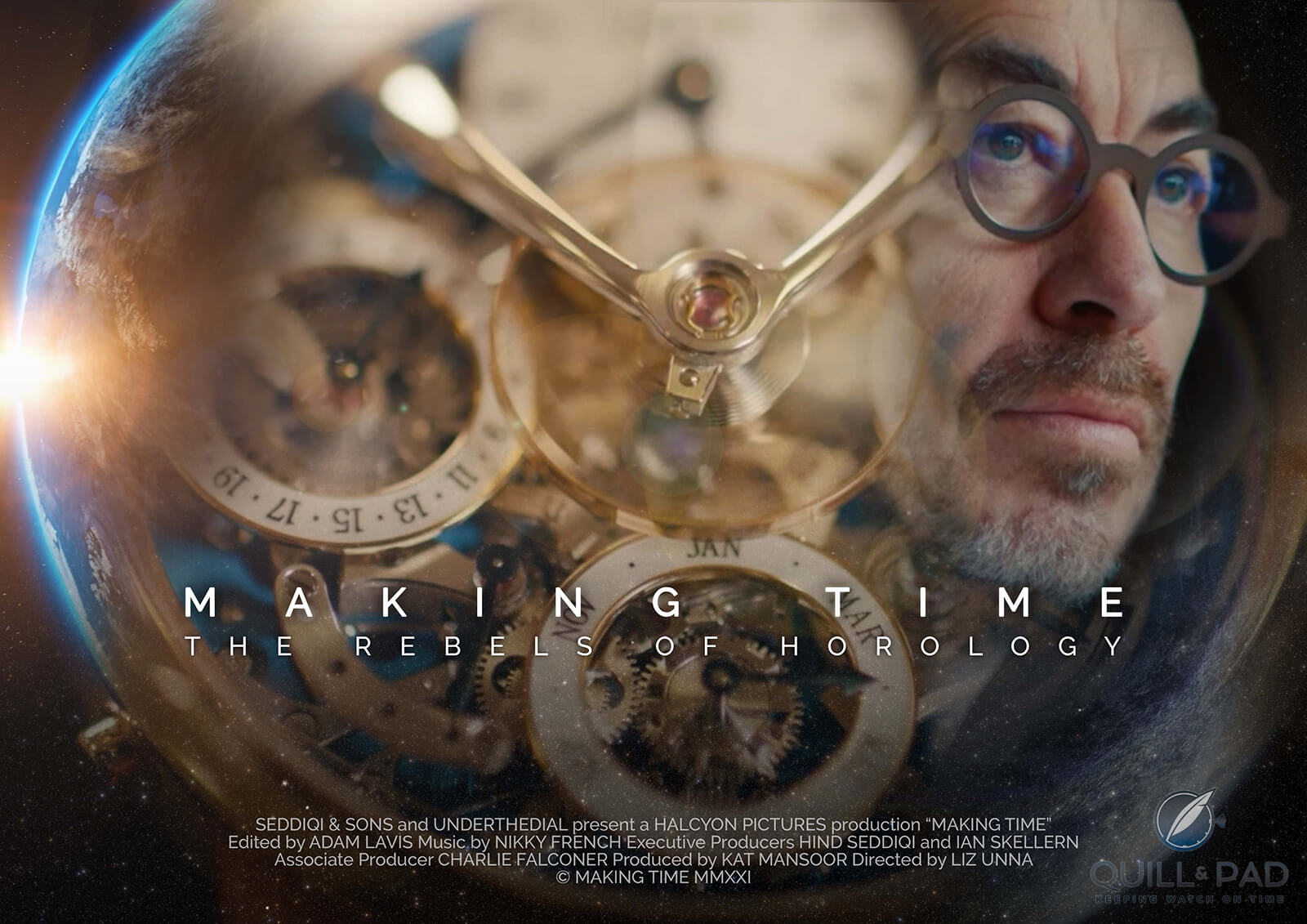
‘Making Time’ poster featuring Ludovic Ballouard
Documentaries are a unique segment of filmmaking because they try to tell a specific story shaped by the goals of the director, all while staying as true to reality as possible. As a result, reviewing a documentary takes a solid understanding that the stories presented are still curated for the maximum emotional impact, and lean heavily on the relatability of the subjects as well as their innate humanness.
So I wanted to approach Making Time from that perspective first because obviously I am also a massive watch nerd. It is going to be hard for me not to love it simply because of its relation to horology and people I personally know and others I only know about. It also doesn’t help that I’ve been in the loop about the project since the very early days of the idea as Ian Skellern has been my colleague since 2013.
He casually told me of his idea before it had been fully fleshed out, I was staying with him during the SIHH a few years ago when he discovered that Hind Seddiqi, Director of Dubai Watch Week, had a similar vision for a film or series, and I got updates as the project became more concrete, sharing in the good news of finding incredible directors and producers, getting support and funding, and having early footage created.
I learned about the setbacks that inevitably come with creating a film and felt invested in its success or failure, even though I had no actual involvement in it. After being absent from Switzerland for two and a half years thanks to Covid, I saw a few minutes of test footage in 2021, essentially an extra-long trailer,.
Therefore, I’m not going into the movie completely unprepared, yet only marginally more so than those who have only seen the trailer. So this review is going to come in two parts: before the first viewing and after taking the time to watch and absorb the film in its entirety.
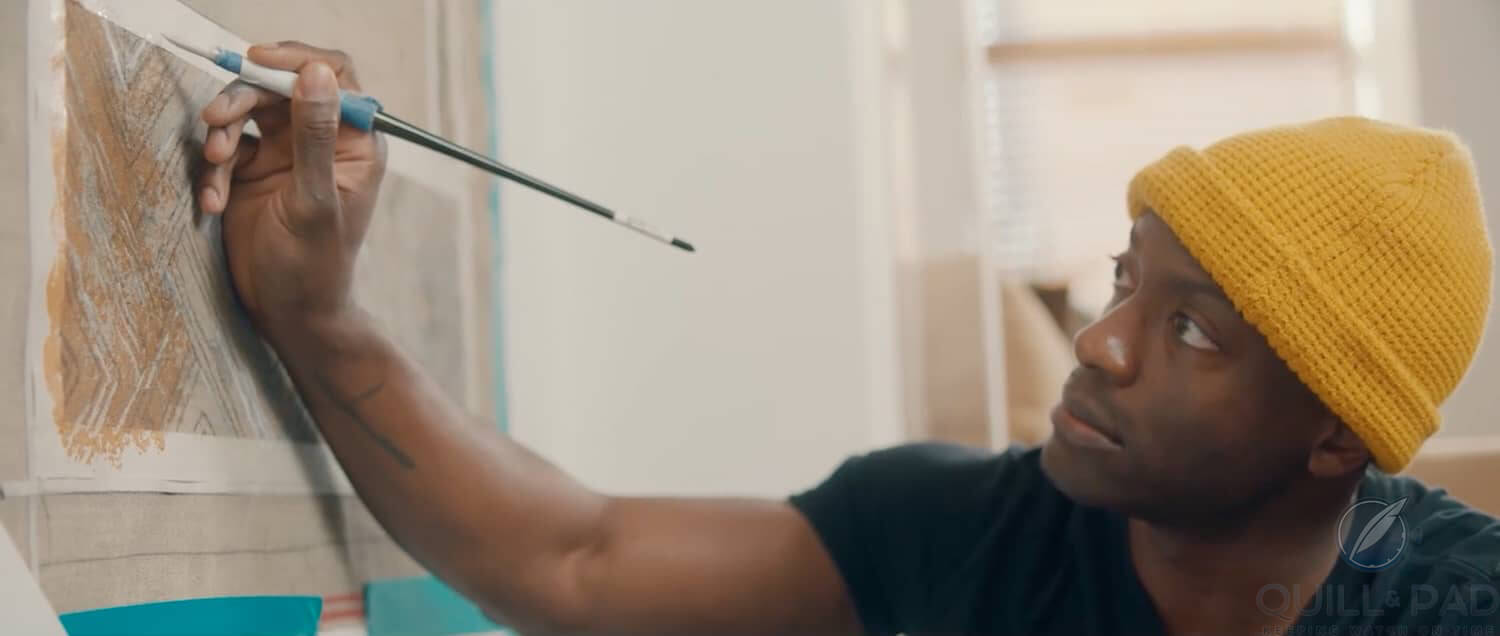
Aldis Hodge in the film ‘Making Time’
Before the first viewing: expectations
I know the goal of the project was originally planned as a Netflix-style documentary series before morphing into what it is now as a hopeful launching pad for such a series in the future, so I expect it to attempt to weave together stories of loss, triumph, hardship, fear, courage, and attempting to break down barriers. The subjects chosen represent a wide range of viewpoints and life experiences, something unique for the watch industry.
It doesn’t take much introspection to understand that watchmaking is largely presented as wealthy, white, and often elderly men, so any deviation from this is going to bring a much-needed diversity of perspective. That perspective is also bound to make us rethink how watchmaking influences the world around us and societal attitudes toward heritage, craft, engineering, and concepts of luxury.
After seeing a few initial minutes of footage a couple of years ago, I know the filmmaking craft is going to be especially high quality, and the use of imagery, pacing, and sound will likely make a real impact on those watching, eliciting an honest and real emotional response. I am truly expecting to tear up from one or more of the stories and feel the vulnerability shared by the subjects as captured by director Liz Unna and producer Kat Mansoor.
This is where I have to withhold any further thoughts until I watch it in its entirety so as to preserve my true reaction, thoughts, and highlights.
First viewing: initial thoughts
I was indeed correct that I would tear up at a couple stories, but I was still surprised at how visceral the stories felt from the first appearance of each subject. Accompanied by the original music of Nicky French, the opening montage immediately thrusts you into a wide world of people experiencing life, feeling what it means to exist. The music reminded me of a Terrence Malick film, sumptuously filled with melancholic nostalgia intermingling with the hope for a future we will never know yet are shaping every day.
The imagery combined with the spoken poetry of one of the film’s main subjects, Brittany Cox, tickled my heartstrings and took me back to a time of wonder when I was young, layered over the knowledge of sorrow and the finite reality that comes with growing older. It’s an appropriate fit since each subject has a related title; her title is “The Storyteller.” As I started to make my way through each story, morsel by morsel, it became clear that these subjects are giving me access to their story from the beginning, each being introduced by way of their childhood.
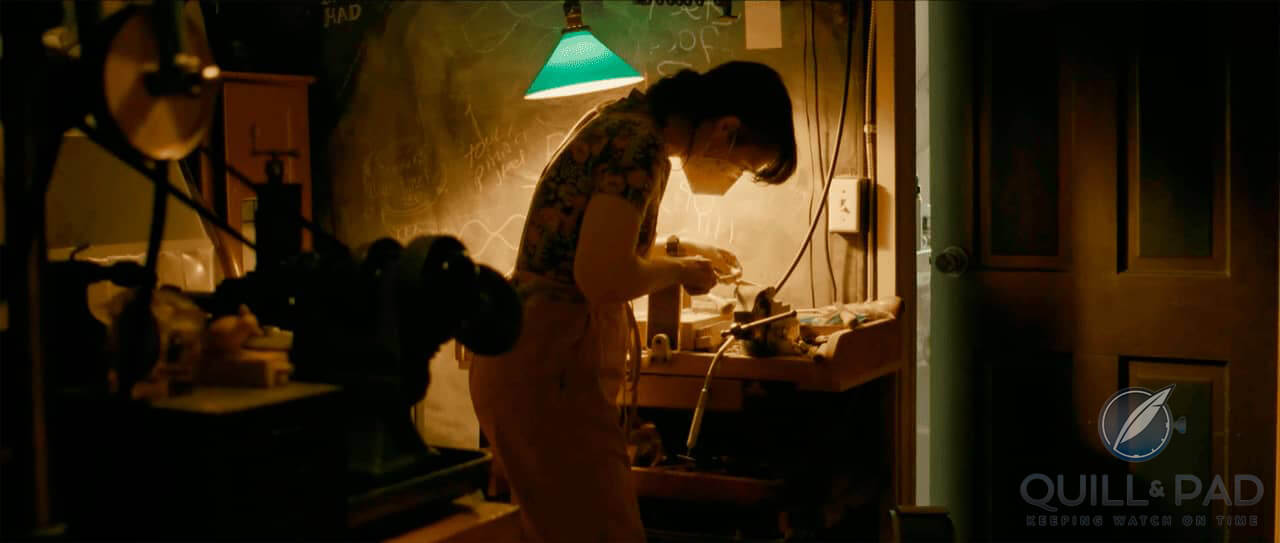
Brittany Cox in the film ‘Making Time’
Cox under her bed where she kept her special treasures; Aldis Hodge drawing on the walls at 12 months old; Philippe Dufour spending time in the forests with his parents; Ludovic Ballouard reminiscing about how he never felt like he experienced time passing as a kid; and Max Büsser sharing the loneliness of not fitting in but wanting desperately to do so. Each story begins with vulnerability and proceeds the subjects sharing intimate details of their lives that seek to humanize the individual.
The pacing of each section, tied to the storytelling and soundtrack, kept me engaged with the narrative being formed, each subject painting a picture of their unique experience. That alone makes this a great documentary, focusing on a human connection with each individual. I finished the film with a real sense of each person, and a warmth that filled me to my fingertips as it framed the stories as ones of hope.
The film ends on a figure sprinkled throughout the stories: Jean-Claude Biver (a legend within the industry) as he presents his philosophy on life and how to measure success as you approach the final minutes before death. Hearing that rudimentary summation of the point he was trying to make might elicit a sadness, sorrow, or fear when faced with our own mortality, but that is the complete opposite of how you come out of the film. As he closes his thoughts (and the film as a whole), his final words provide an immense feeling of satisfaction – perhaps only from my perspective – on where to direct our efforts in life.
It truly wraps up each story into a singular idea of life and success as the culmination of our investments in love and our passion, our life’s work. The idea is something I have been mulling over for years: how to define my life as a success so that I could work toward that goal but without being consumed by an impossible “end point” to my days. It fits perfectly with the narrative journeys each subject went on over the course of the film and reignited a burning ember within me to continue to pursue my passion and invest in love.
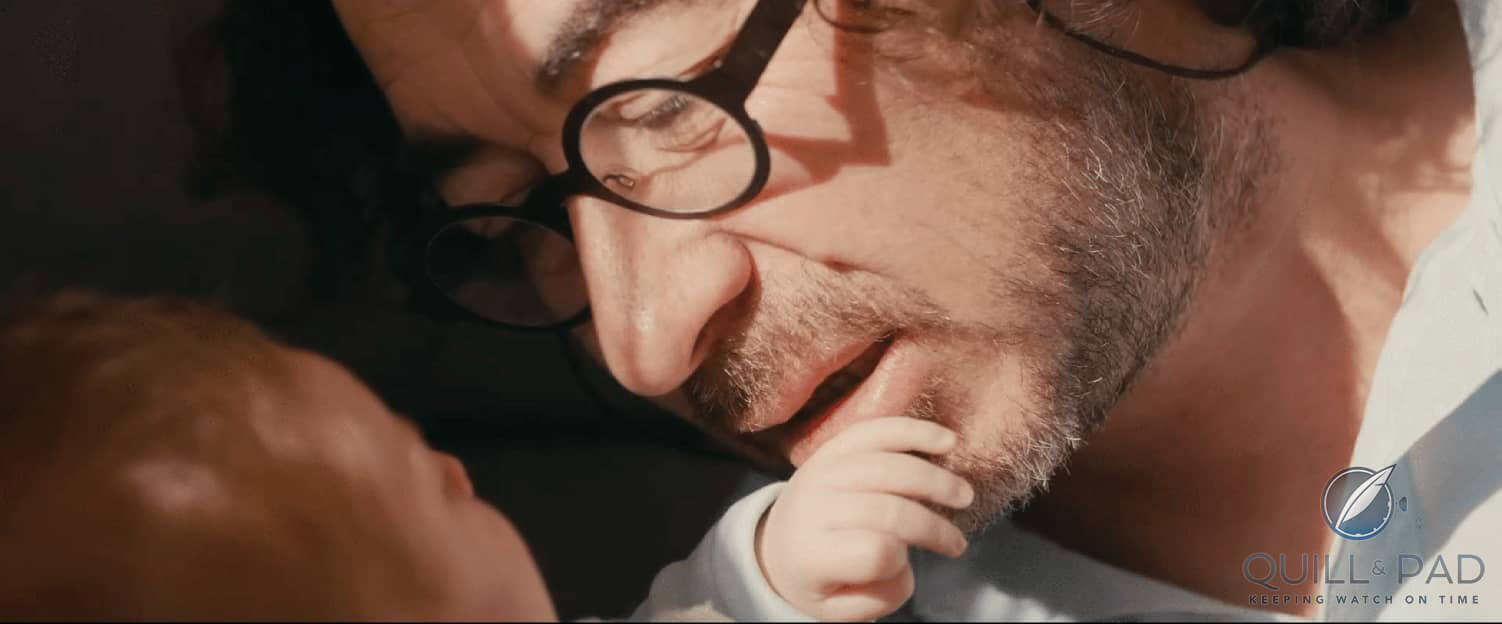
Ludovic and Gabriel Ballouard in the film ‘Making Time’
Themes, subtext, foundations
Every good documentary focuses on a handful of themes, and Making Time is no different. The most obvious themes are time and our experience of it, but more so in relation to how time happens to us and our attempts to understand its effects on our lives. Making Time bounces back and forth between each subject, giving different perspectives and distinct history that helped each person become the adult they are today.
There is a solid sense of parallelism between different people, whether it be young family trauma, hardships as a young adult, or struggles adapting to the harsh world that does not make it easy to be different. Each subject shares a somewhat similar path with at least one other, especially when it comes life-defining moments.
Hodge and Dufour share the experience of being unsupported in their goals. Büsser and Ballouard share the fulfillment of building a family after losing someone important to them. Dufour and Cox share the desire to protect the old ways. Hodge and Büsser share complicated relationships with a father figure (though it is more implied than stated for Hodge). Cox and Ballouard share the intimate understanding of time slipping past. Everyone shares a desire to leave something behind, each in their own way, to create a legacy.
Family plays a vital role in Making Time since family has the ability to hurt and heal, inspire and belittle, and generally build a foundation for a life lived well. Ballouard has probably the most emotional journey of loss and rediscovery regarding family, while Hodge demonstrates how family can be the literal life-saving factor for an individual. Dufour is the most typical and atypical at the same time, fulfilling the long-held Swiss tradition of passing on your skills to your child for them to take over the family’s horological future while building a family in a way that shook up the quiet valley where he resides.
Harsher realities
That demonstrates another parallel theme that might not have been expected: racism and bigotry. Aldis Hodge experienced it in full force growing up between New York, New Jersey, and California in the 1980s and ’90s, and being such an accomplished and creative black child, it isn’t hard to imagine that he understands the frustratingly sad reality of working twice as hard to accomplish half as much as some of his lighter-skinned peers. His drive and intelligence are outstanding, yet he recalls the struggles to be taken seriously and get opportunities to succeed even with the unflinching support of his mother.
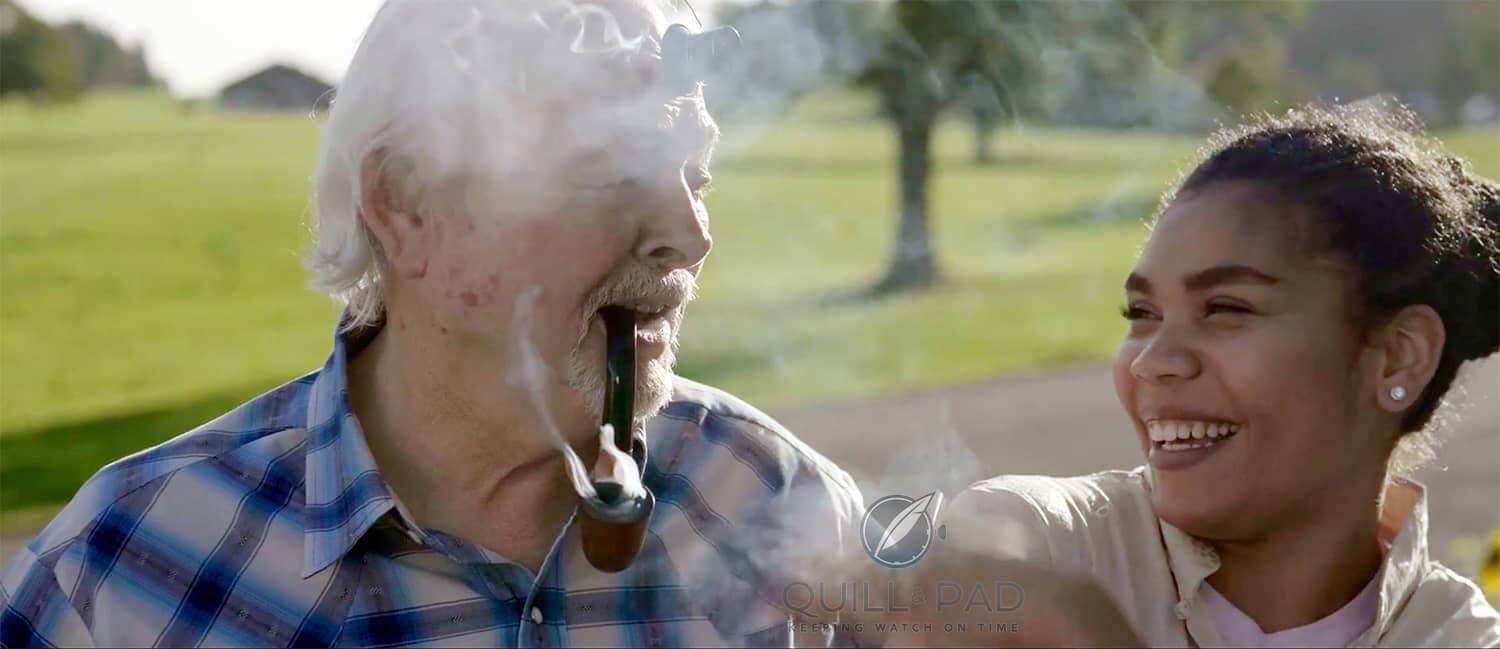
Philippe and Daniela Dufour in the film ‘Making Time’
This is paralleled with a surprising person: the “master” Philippe Dufour. As his wife Elisabeth and daughter Danièla are black and have lived in the quiet Swiss valley for two decades with a living legend of horology, they have experienced racism, bigotry, and suspicion in a very distinct way. Dufour’s daughter Danièla has struggled under the shadow of her famous father as she made her way through watchmaking school in a bid to join her father at the bench.
Yet through this hardship it has created an opportunity for Dufour to finally realize something he has dreamed of for decades: a successor. After trying multiple times to take on apprentices and having none of them work out, he was left worried that his watches would die with him. But Danièla, as stubborn as her father, forged ahead to prove she could not only be a talented watchmaker, but one worthy of carrying on the Dufour name.
This is another massive theme on display throughout Making Time: the idea of legacy and that of second chances. Dufour is the most obvious example, but Hodge, Ballouard, Cox, and Büsser all show how creating a legacy is a driving factor, even if that legacy may not be identical for any of them. Büsser, Hodge, and Ballouard also demonstrate how important family is to that legacy, with Ballouard and Büsser finding their peace thanks to the family they build, and Hodge following his passions with the support of the family he’s always known.
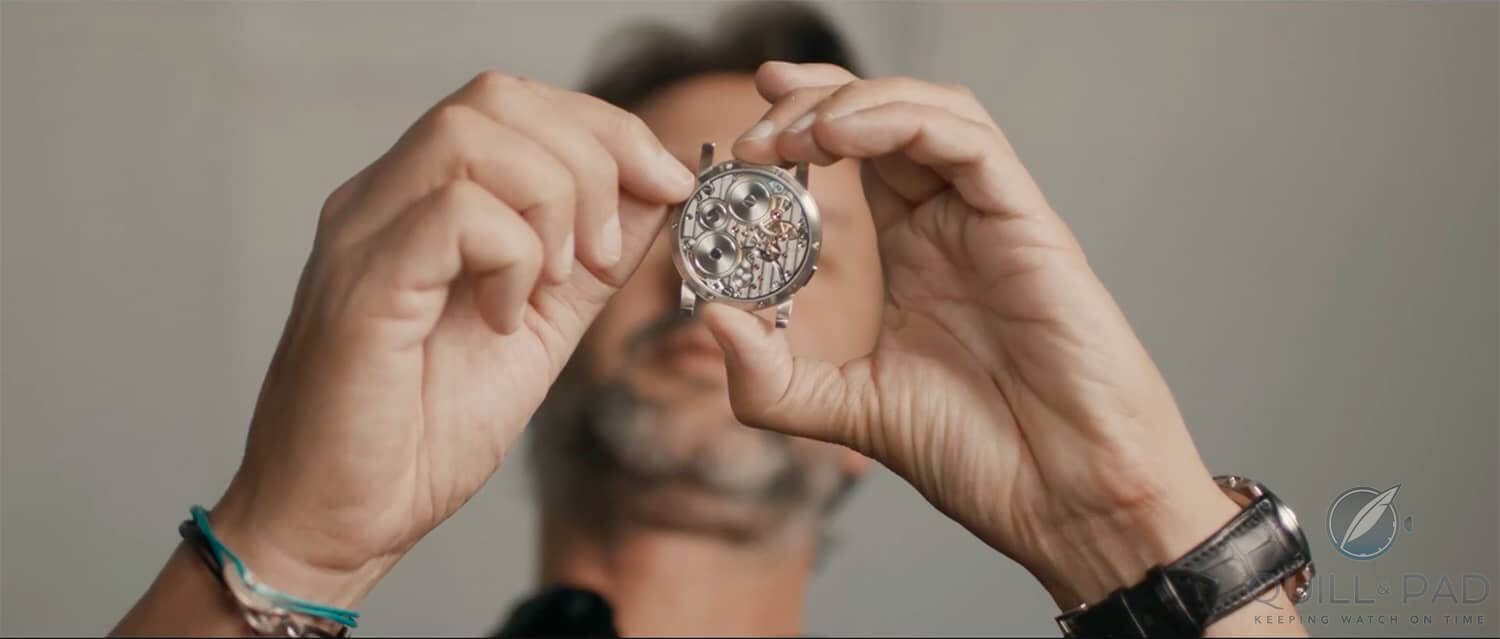
Max Büsser in the film ‘Making Time’
Deeper consideration
For every subject of Making Time, it is true that there is a deep consideration of time as a concept and how it plays into their lives from five different vantage points. Even then, similar conclusions seem to have been reached by each individual, some universal truths that help to drive what they do.
That truth?
One day, I will die.
It manifests differently for each person but the reality and understanding of this inescapable fact causes them to focus on living their life well with love, patience, and passion. It drives them to create something incredible to be left after they are gone. Whether it be watches, skills, art, or their own family, each grasps how important it is to be able to say, “I was here, and I lived.”
You probably wouldn’t have expected a documentary about horologists to be so existential, but this is precisely why this is a human documentary that just so happens to be loosely centered on this industry that so many love. Yet it makes sense: ever since my very first Baselworld I understood that the core of watchmaking is people, not the watches. Watches are just a shared passion and a focus for our creative output that brings us together. But what makes the industry what it is are the people.
Interestingly, it is that idea that I believe helps to make this documentary so great at establishing a relationship between the audience and the subjects. Bordering on a parasocial relationship, by the end of the film there is a sense that we know these people. It could be simply thanks to a genuine and honest depiction of who these people are and a glimpse into their thoughts in ways I would never get by covering the work that they do.
I might also be feeling a bit more of a connection since I know Max Büsser and Philippe Dufour beyond a passing introduction. Having spent time talking, eating, and laughing, this documentary provided a window into their lives in a different way than I might have ever experienced. Knowing Ludovic Ballouard only in passing, without having had much time for more than basic pleasantries since I don’t speak French, Making Time allows me to understand who he is that would otherwise be hard due to the language barrier.
Aldis Hodge is the best example of a parasocial relationship as I am very aware of who he is and his work, have friends and colleagues that work with him, even are friends, yet I have never had the pleasure of meeting him. I’m sure we would have a lot to talk about, being Americans and outsiders to the industry, both with a passion and desire to build our own watches, but he with a massive public profile while I look on from the sidelines.
After watching Making Time a few times, I am left with one overarching feeling: hope. I saw the highs and lows of these people presented in such a way to both empathize with and be inspired by who they are and what they have to share. As I mentioned, it has reignited the spark of creativity and passion to pursue my ideas and create the life I want to create.
It was fitting that it ended with Jean-Claude Biver defining success as he did, tying all the different threads together, allowing us to take it and run with it. Making Time is not for watch lovers, it is not for engineers or horologists, and it is not for proud Swiss citizens. Making Time is for people who love life. It reminds us through five different stories that we all have so much life to live, so much passion to explore, love to experience, and that we don’t know how much time we have left so we should just get on with it.
I definitely was not expecting such a moving reflection of the human condition, but it just goes to show that the best documentaries are really just mirrors of ourselves.
Distribution
Making Time will screen in Canadian cinemas in February 2023 followed by Canadian TV, and discussions are underway in other markets.
Making Time is now available to stream or download. It was filmed for the cinema, so you will be rewarded by watching it on the largest screen you can.
Amazon: https://www.amazon.com/Making-Time-Philippe-Dufour/dp/B0B8T88DRM/ref=sr_1_1?crid=25HJSSYAJT9MC
iTunes: https://itunes.apple.com/us/movie/making-time/id1653458979?ls=1
Vimeo: https://vimeo.com/ondemand/makingtime
Google Play: https://play.google.com/store/movies/details?id=4x3KQg4ZwaY.P&sticky_source_country=US&gl=US&hl=en
Journeyman Pictures: https://www.journeyman.tv/film/8365/making-time
For more information, a preview clip, streaming links and latest news, please visit https://makingtime.film/.
You may also enjoy:
Presenting ‘Making Time’: The Greatest Watch Film Ever Made (In My Extremely Biased Opinion)
Philippe Dufour 70th Birthday Celebration Film
‘Time Piece’: If You Only Watch One Film On Independent Watchmaking, Watch This One
Leave a Reply
Want to join the discussion?Feel free to contribute!



Hi, I joined a kickstarter movie project “keeper of time” by Michael Culyba, with exactly the same people featuring. Odd coincidence?
Hi Raffaello, while it might look like a coincidence I suspect that there were simply a few overlapping motivations in the choice of the subjects featured. We began Making Time early 2018, which was long before Keeper of Time launched on Kickstarter.
Our subject choices we based on horologists who:
– Had strong personal stories
– Were willing to share their personal stories publically
– Came across well on film explaining their personal stories
– Were diverse in their backgrounds, approaches, ethnicities, nationalities, sex, and horology
– Were available for our filming schedules
– And were relatively affordable for our budget. We would have loved to include an Asian watchmaker, but the expense would have meant that we couldn’t produce a film to the high production standards we wanted.
That’s a smaller pool than you might think.
Regards, Ian